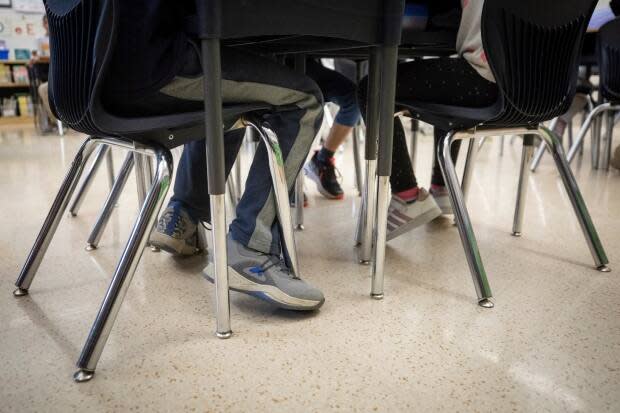N.B. school districts not using clause that helps students with disabilities, says advocate

New Brunswick's child and youth advocate says the school districts aren't doing everything they can to ensure students with disabilities are kept with the same education assistants when it serves the best interest of the children.
Kelly Lamrock is now calling on the Department of Education to implement a policy by September that would oblige the districts to take advantage of a clause in education assistants' collective agreement, which would ensure that happens.
In a news conference Thursday, Lamrock released a report from his investigation into the use of the clause, known as the "delicate relationship" clause, contained in the collective agreement between CUPE, the union representing education assistants, and their employer, the school districts.
Lamrock said the clause was introduced in 2008 as a way to prevent an education assistant with more seniority from "bumping" another education assistant out of their position if a specialist deemed that doing so would be detrimental to the student.
Lamrock said that through questioning the province's seven school districts, he found none of them had taken advantage of that clause in years.
He said it was also unclear whether any districts sought expert advice on when using the clause would benefit a child.
Further, Lamrock said, the option of taking advantage of the clause isn't being explicitly communicated to parents, and in some cases has been denied.
"It's one thing to not use it, it's another to never even be curious about using it," Lamrock said. "It's another never even to mention it exists.
"And that culture of silence around defeating children's rights has to stop. You can't have adults colluding to say Let's not ask if this is affecting the child.'"
CBC News asked New Brunswick's seven school districts what actions would be taken in light of Lamrock's report.
Jennifer Read, spokesperson for Anglophone School District West, said in an email that the district will reflect on Lamrock's findings and discuss any next steps as a team.
She said the district has two students who are qualified for delicate relationship status with their education assistant, but district does not track when requests are made.
CBC News is awaiting a response from the Department of Education.
The value in having the same EA
Lamrock said that until 2008, the education assistants' collective agreement allowed an education assistant to claim a position already filled by another education assistant who had fewer years of service, in a practice referred to as bumping.
The introduction of the delicate relationship clause, however, recognized the benefits of keeping a student with the same education assistant if the student had gained a strong sense of familiarity and comfort with that particular staff.

"A number of students — a small number, to be sure, but still some children — rely upon familiarity, trust, and routine in order to feel safe and be able to learn," Lamrock wrote, in his report.
"Sometimes they have a need for routine due to a unique condition, as with some learners with autism spectrum disorder. Some have conditions which require physical care which is intimate and frequent and these rituals are best carried out by someone the child knows and trusts."
Complaints from parents and professionals
Lamrock said his investigation was prompted by families and professionals contacting his office for help navigating the issue.
He said one case he heard involved a girl who needs to be fed using a surgically implanted gastronomy tube, which required three weeks of training before an education assistant was prepared to work with her.
Lamrock said her parents tried getting the delicate relationship clause applied to their daughter to prevent regular turnover of education assistants working with her, but they were unsuccessful.
Other cases involved students being denied protection for an existing relationship with an education assistant.
"Others [cases] have dealt with children with communication or behavioural issues whose individual nuances of communication made familiarity a huge advantage to an assistant seeking to de-escalate the student and avoid having them sent home early."
Lamrock is also recommending the clause be applied to temporary workers, in addition to permanent employees, and that the Department of Education track the number of delicate relationships by region, including requests for the designation, acceptances, rejections and the corresponding reasons.


